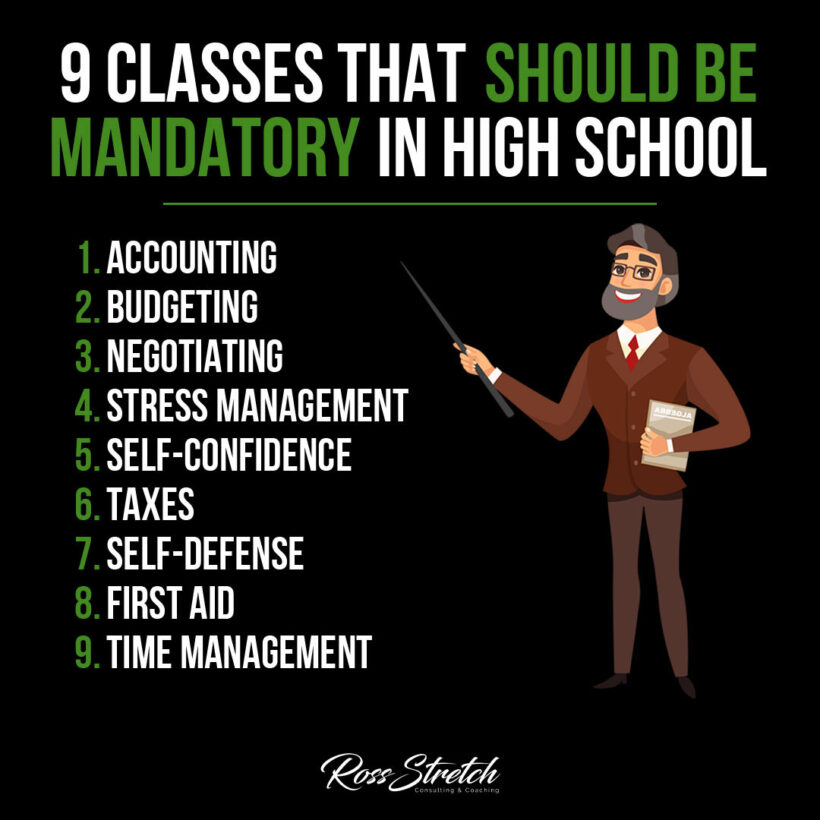Many students graduate from high school without knowing essential life skills. While traditional subjects are important, adding practical classes could help young adults face real-world challenges. Here are nine classes that should be part of every high school curriculum.
1. Accounting
Understanding basic accounting helps people keep track of their finances, manage expenses, and make informed financial decisions. High school students with accounting knowledge can learn how to manage their personal or business finances effectively.
- Why It Matters: Accounting skills are crucial for personal finance and business.
- What Students Would Learn: Basic financial statements, managing cash flow, and simple bookkeeping.
2. Budgeting
A budgeting class would teach students how to plan their income and expenses. Knowing how to budget is essential for financial independence, and learning it early can prevent debt and financial stress later on.
- Why It Matters: Budgeting helps people live within their means.
- What Students Would Learn: Setting financial goals, tracking spending, and saving money.
3. Negotiating
Negotiating is a valuable skill in many situations—whether it’s for a job salary, a contract, or a purchase. Teaching negotiation helps students communicate their needs confidently and get fair deals.
- Why It Matters: Negotiation skills can lead to better outcomes in professional and personal situations.
- What Students Would Learn: Techniques for negotiation, active listening, and persuasive communication.
4. Stress Management
High school can be stressful, and so can adult life. A class on stress management would teach students healthy ways to handle stress, which is vital for mental health and overall well-being.
- Why It Matters: Managing stress is key to mental health and productivity.
- What Students Would Learn: Relaxation techniques, time management, and positive coping strategies.
5. Self-Confidence
Building self-confidence is essential for personal growth and success. A self-confidence class would focus on self-awareness, positive thinking, and goal-setting, giving students the tools they need to believe in themselves.
- Why It Matters: Confidence helps students face challenges and pursue opportunities.
- What Students Would Learn: Setting personal goals, handling criticism, and building self-esteem.
6. Taxes
Filing taxes is something every adult has to do, yet it’s rarely taught in school. A class on taxes would cover the basics of income tax, deductions, and how to file returns, so students aren’t overwhelmed when tax season arrives.
- Why It Matters: Taxes are a part of adult life, and knowing how to file them saves time and money.
- What Students Would Learn: Income tax basics, types of deductions, and filing a tax return.
7. Self-Defense
Self-defense training can give students confidence and a sense of safety. Learning basic self-defense techniques helps people protect themselves if they ever face a threatening situation.
- Why It Matters: Self-defense skills promote safety and personal empowerment.
- What Students Would Learn: Basic self-defense moves, situational awareness, and personal safety strategies.
8. First Aid
Knowing first aid can be life-saving. A first aid class would teach students how to handle medical emergencies, treat minor injuries, and respond calmly in crises.
- Why It Matters: First aid knowledge can save lives and prevent injuries from worsening.
- What Students Would Learn: CPR, wound care, and emergency response techniques.
9. Time Management
Time management is an essential skill for success in school, work, and life. A time management class would help students learn how to prioritize tasks, set goals, and manage their time effectively.
- Why It Matters: Good time management leads to productivity and less stress.
- What Students Would Learn: Creating schedules, setting priorities, and avoiding procrastination.
Conclusion
These nine classes would prepare high school students for real-life challenges. Skills like budgeting, stress management, and time management aren’t just useful—they’re necessary for a balanced and successful life. By adding these courses to the high school curriculum, schools could better equip students to handle adulthood with confidence and competence.


